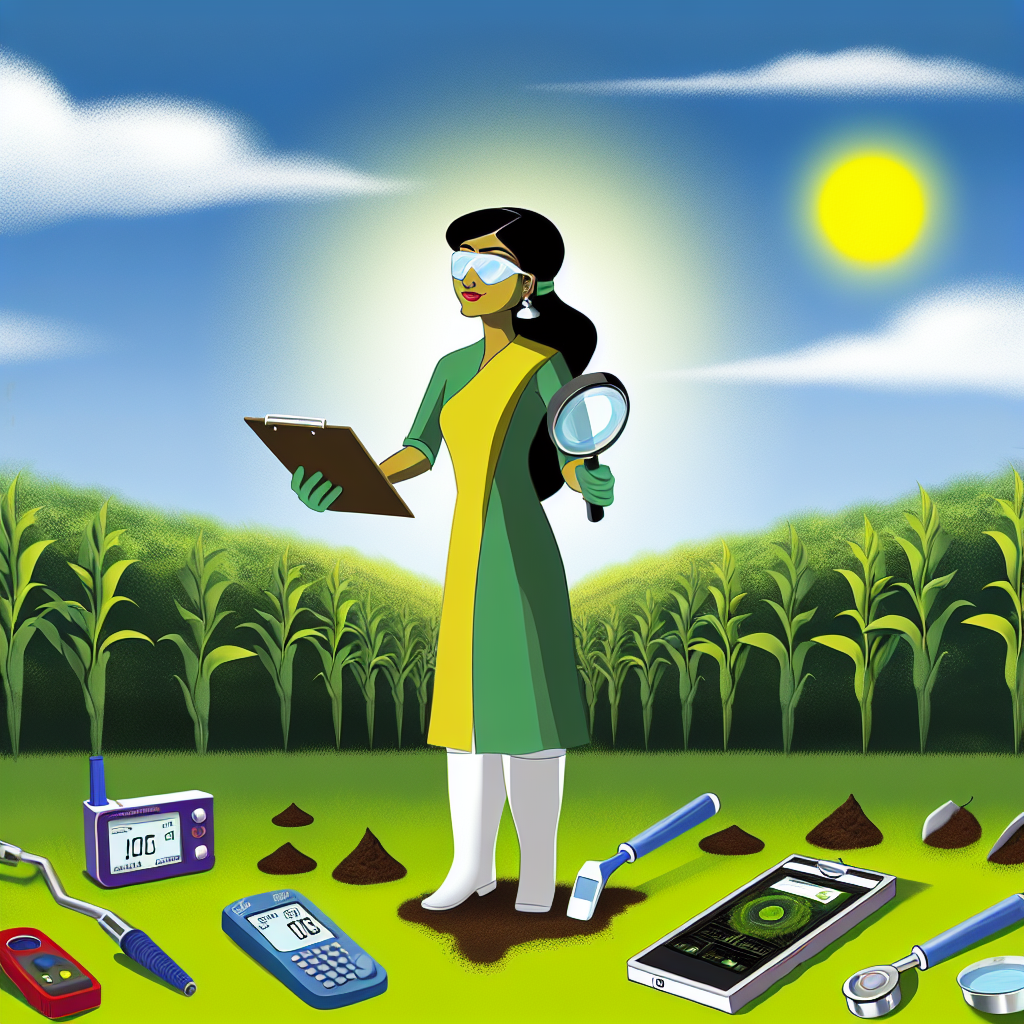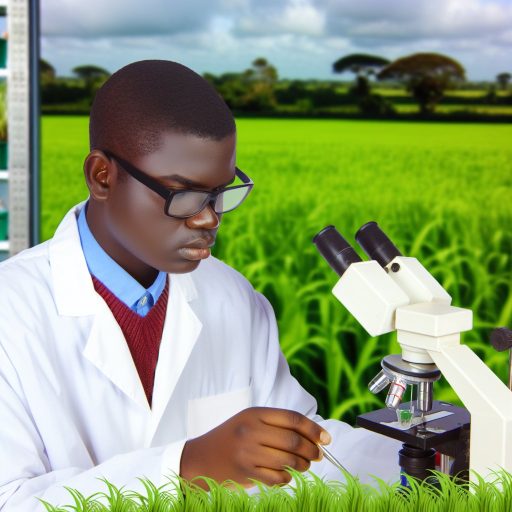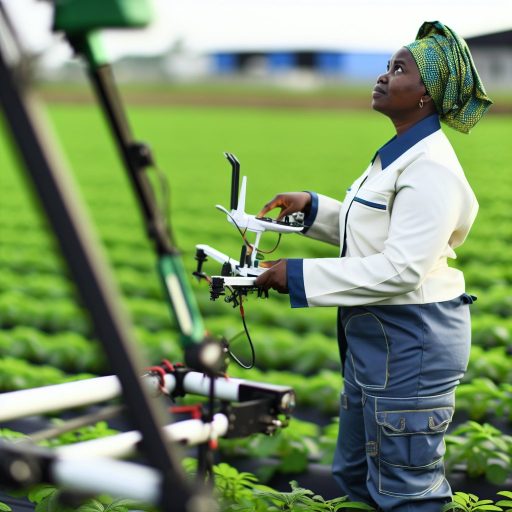The Role of Agronomists in Enhancing Crop Yields in Nigeria
Identifying and Developing High-Yield Varieties
Agronomists play a vital role in selecting high-yield crop varieties.
They conduct extensive research on local soil and climate conditions.
This research helps identify the best crop types for specific regions.
Moreover, agronomists collaborate with local farmers for practical insights.
This collaboration ensures the varieties meet farmers’ needs effectively.
Implementing Sustainable Agricultural Practices
Sustainable practices are crucial for long-term agricultural success.
Agronomists train farmers on crop rotation and diversification techniques.
These techniques improve soil health and increase productivity.
Additionally, agronomists promote integrated pest management to control pests.
This approach minimizes chemical usage and protects the environment.
Adopting Innovative Farming Technologies
Modern technologies enhance agricultural efficiency and productivity.
Agronomists introduce precision farming tools to Nigerian farmers.
These tools help optimize inputs such as water and fertilizers.
Furthermore, agronomists advocate for the use of drones in crop monitoring.
Drones provide data that helps farmers make informed decisions quickly.
Supporting Education and Training Programs
Education is key to improving farming practices in Nigeria.
Agronomists organize workshops and training sessions for farmers.
These programs cover a range of topics, including soil management.
Furthermore, they emphasize the importance of data-driven farming techniques.
Such initiatives build farmers’ confidence and increase adoption of best practices.
Research and Development Initiatives
Continuous research is essential to address agricultural challenges.
Agronomists collaborate with universities and research institutions.
They focus on developing new techniques tailored for local conditions.
This research addresses issues like climate change and pest invasions.
Ultimately, it fosters agricultural resilience and long-term growth.
Policy Advocacy and Collaboration
Agronomists also engage in policy discussions and advocacy.
They work with government agencies to shape agricultural policies.
Additionally, agronomists collaborate with NGOs to implement projects.
These efforts aim to improve food security and farmer livelihoods.
Through policy advocacy, agronomists influence crucial funding and support.
Sustainable Agricultural Practices Introduced by Agronomists
Innovative Crop Rotation Techniques
Agronomists have implemented innovative crop rotation techniques.
This practice enhances soil fertility and structure.
It reduces pests and diseases in crops effectively.
Farmers report higher yields and better quality produce.
Use of Organic Fertilizers
Organic fertilizers have gained popularity among farmers.
Agronomists advocate for their environmental benefits.
These fertilizers improve soil health over time.
Moreover, they increase crop resilience to pests.
Conservation Tillage Methods
Conservation tillage minimizes soil disturbance.
This approach protects soil structure and health.
Agronomists educate farmers on its many advantages.
As a result, water retention in soils improves significantly.
Integration of Agroforestry
Agronomists promote the integration of agroforestry systems.
This method combines agriculture with tree planting.
It provides additional income through timber and fruit.
Additionally, it enhances biodiversity and ecosystem stability.
Adoption of Pest Management Strategies
Integrated Pest Management (IPM) is widely recommended.
This strategy combines biological, cultural, and chemical controls.
Agronomists encourage farmers to monitor pest levels continuously.
Consequently, farmers can make informed decisions on pest control.
Promotion of Drought-Resistant Crop Varieties
Agronomists focus on developing drought-resistant crops.
These varieties are crucial for areas prone to water scarcity.
Farmers using these crops experience higher survival rates.
They also contribute to food security during climate challenges.
Impact of Agronomic Research on Local Farming Communities
Enhancing Crop Yields
Agronomic research has significantly improved crop yields in Nigeria.
New farming techniques boost productivity and efficiency.
For instance, farmers now use drought-resistant varieties.
This adaptation mitigates the effects of climate change.
Training and Capacity Building
Capacity building plays a crucial role in agricultural growth.
Extension services train farmers in best practices.
Local agricultural institutions offer workshops regularly.
These initiatives enhance farmers’ knowledge and skills.
Access to Resources
Agronomic research facilitates access to vital resources for farmers.
Farmers gain insights into soil health through research findings.
They learn about effective pest management strategies as well.
This knowledge leads to healthier crops and higher profits.
Economic Impact
Improved agricultural practices positively impact local economies.
Higher crop yields translate to increased income for farmers.
This boost uplifts entire communities economically.
Consequently, families have better access to education and health care.
Strengthening Food Security
Agronomic innovation directly enhances food security in Nigeria.
With more stable food production, communities experience less hunger.
Food diversity also increases with various crop introductions.
Thus, nutritional needs of the population are better met.
Delve into the Subject: The Future of Agribusiness in Nigeria: Careers in Agro-processing
Collaboration Between Agronomists and Farmers
Strengthening Partnerships
Agronomists and farmers often work together to improve crop yields.
This partnership fosters trust and a shared understanding of agricultural needs.
For instance, in Kano State, agronomists provide tailored advice to local farmers.
This collaboration led to a 30% increase in maize production in one season.
Case Study: The Rice Initiative
In the northern region, the Rice Initiative improved farming practices.
Agronomists trained farmers on sustainable irrigation techniques.
The introduction of high-yield rice varieties boosted harvests significantly.
Farmers reported better income, which allowed for community investments.
Innovative Techniques for Pest Control
Agronomists developed integrated pest management strategies with local farmers.
This approach reduced pest loss without using harmful pesticides.
As a result, farmers observed a healthier crop ecosystem.
Access to Technology and Resources
By collaborating, agronomists connect farmers to new agricultural technologies.
Publish Your Professional Profile, Business or Brand
Showcase your expertise, gain trust, and boost visibility instantly on Professions.ng.
Publish NowMobile apps provide real-time information on weather and market prices.
Farmers gain confidence, leading to timely planting and harvesting decisions.
Success Stories
David Akintola, a farmer from Ogun State, shared his experience.
He utilized agronomist advice to implement crop rotation.
Consequently, his soil health improved, and profits doubled within two years.
Engaging Local Communities
Agronomists also hold workshops in rural areas to educate farmers.
These sessions cover innovative farming techniques and market trends.
As a result, community members feel empowered and informed.
Uncover the Details: Top Agricultural Science Careers Transforming Nigeria’s Farming Sector
Innovations in Pest and Disease Management Led by Agronomists
Introduction to Agronomic Innovations
Agronomists in Nigeria are pioneering advancements in pest and disease management.
They employ innovative techniques to combat agricultural challenges effectively.
These professionals play a crucial role in enhancing food security in the nation.
Integrated Pest Management Strategies
One prominent approach is integrated pest management (IPM).
This strategy combines biological, cultural, and chemical tools.
Agronomists tailor IPM programs to specific crops and local conditions.
For instance, they recommend crop rotation to disrupt pest life cycles.
This method significantly reduces pesticide reliance and environmental impact.
Use of Technology in Pest Control
Technological tools are transforming pest management practices.
Agronomists utilize drone technology for early pest detection.
These drones provide real-time data on crop health and pest populations.
Consequently, farmers can implement timely interventions.
Research and Development Initiatives
Research plays a fundamental role in advancing agricultural practices.
Agronomists conduct trials to develop pest-resistant crop varieties.
For example, they focus on breeding crops with natural resistance traits.
This improves yields and reduces chemical pesticide usage.
Collaboration with Farmers and Communities
Effective pest management requires strong collaboration with farmers.
Agronomists provide training programs on best practices in pest control.
They also share successful management experiences from local farmers.
Such initiatives empower communities to adopt sustainable practices.
Impact on Agricultural Growth
Innovations in pest and disease management contribute to agricultural growth.
They lead to increased crop yields and improved quality.
In turn, this boosts the economy and enhances food security in Nigeria.
Furthermore, these practices promote environmental sustainability.
Uncover the Details: Step-by-Step Guide to Pursuing a Career as an Agronomist in Nigeria

The Importance of Soil Health and Agronomic Practices in Nigeria
Significance of Soil Health
Soy health is crucial for sustainable agriculture in Nigeria.
Healthy soil increases crop productivity and resilience.
It supports the growth of beneficial microorganisms.
Additionally, it enhances nutrient availability for plants.
Maintaining soil health can mitigate the effects of climate change.
Furthermore, healthy soil promotes water retention and reduces erosion.
Agronomic Practices for Soil Health
Implementing good agronomic practices is essential for soil sustainability.
Crop rotation helps prevent soil depletion and pest buildup.
Furthermore, intercropping enhances biodiversity and soil fertility.
Reduced tillage techniques preserve soil structure and health.
Cover crops contribute to soil cover and reduce erosion.
Utilizing organic fertilizers can enrich soil nutrients effectively.
Challenges to Soil Health
Nigeria faces several challenges impacting soil health.
Urbanization leads to decreased agricultural land availability.
Inadequate agricultural education limits proper soil management practices.
Over-reliance on chemical fertilizers can degrade soil quality.
Climate change has increased the frequency of extreme weather events.
Government and NGO Efforts
The government is promoting initiatives for soil restoration.
NGOs are providing farmers with training on sustainable practices.
Additionally, research and development in agronomy are gaining momentum.
Collaboration between farmers and experts encourages knowledge exchange.
Future Directions
Investing in soil health will boost agricultural productivity in Nigeria.
Future policies should emphasize sustainable and resilient practices.
Education is vital for empowering farmers with necessary skills.
Moreover, innovative technology can play a key role in soil management.
Ultimately, a collective effort will enhance food security in Nigeria.
Find Out More: Top Agricultural Professions Boosting Nigeria’s Economy
Policy Advocacy by Agronomists for Agricultural Development in Nigeria
Agronomists play a pivotal role in shaping agricultural policy in Nigeria.
They engage in active dialogue with policymakers on crucial agricultural issues.
Through research, they provide data-driven insights that inform decision-making.
In addition, they advocate for sustainable practices that enhance productivity.
Collaboration with government bodies helps align agricultural policies with local needs.
Influencing Agricultural Policies
Agronomists influence agricultural policies through research and expertise.
They assess the impact of existing policies on local farmers.
Their insights help refine policies for better outcomes.
Furthermore, they highlight the importance of crop diversity in policy discussions.
Engaging with farmers allows them to understand ground realities.
Training and Capacity Building
Training programs are essential for empowering farmers with knowledge.
Agronomists conduct workshops aimed at improving farming techniques.
These trainings cover soil management and pest control strategies.
Invariably, they help farmers adopt better practices that enhance yields.
This capacity building creates a more resilient agricultural sector.
Promoting Research and Innovation
Agronomists advocate for increased funding for agricultural research.
Research initiatives focus on improving crop varieties and farming methods.
Innovations such as drought-resistant crops are essential for resilience.
Moreover, they promote the use of technology in agriculture.
The significance of precision farming in optimizing resources cannot be overlooked.
Building Partnerships and Networks
Establishing partnerships is crucial for broadening resource access.
Agronomists collaborate with non-governmental organizations to enhance outreach.
Networking with international agricultural bodies facilitates knowledge exchange.
These initiatives foster sustainable agricultural practices across Nigeria.
Through collective efforts, they address food security challenges effectively.
Future Trends in Agronomy and Implications for Nigeria’s Agricultural Sector
Technological Advancements in Agronomy
Technological innovations are shaping the future of agronomy in Nigeria.
Publish Your Professional Profile, Business or Brand
Showcase your expertise, gain trust, and boost visibility instantly on Professions.ng.
Publish NowPrecision agriculture tools are becoming essential for farmers.
These tools enable farmers to monitor crop health effectively.
Furthermore, artificial intelligence is improving decision-making processes.
Farmers can now analyze data to optimize yields.
Climate Resilience Strategies
Climate change poses significant risks to agriculture in Nigeria.
Agronomists are developing resilient crop varieties to withstand harsh conditions.
These varieties can thrive in drought-prone areas.
Moreover, sustainable practices are being promoted to enhance soil health.
Implementing these strategies will help secure food sources.
Capacity Building and Education
Education is vital for advancing agronomic practices.
Agronomists are conducting training programs for local farmers.
This education focuses on modern farming techniques and technology use.
Community workshops effectively disseminate knowledge.
Such initiatives empower farmers to adopt best practices.
Investment Opportunities in Agronomy
The agronomy sector in Nigeria is ripe for investment.
Investors are increasingly recognizing its potential for growth.
Funding innovative agronomic solutions can lead to substantial returns.
Additionally, public-private partnerships are becoming more prevalent.
These collaborations can enhance agricultural productivity dramatically.
Regulatory Support and Policy Framework
A supportive regulatory environment is crucial for agronomy’s growth.
Policies that foster research and development can yield significant benefits.
Government initiatives are needed to promote sustainable agriculture.
Additionally, creating favorable trade conditions will enhance market access.
Robust policies can help in overcoming existing challenges in agriculture.
Additional Resources
Reviving Agricultural Extension for Effective Transition from …




